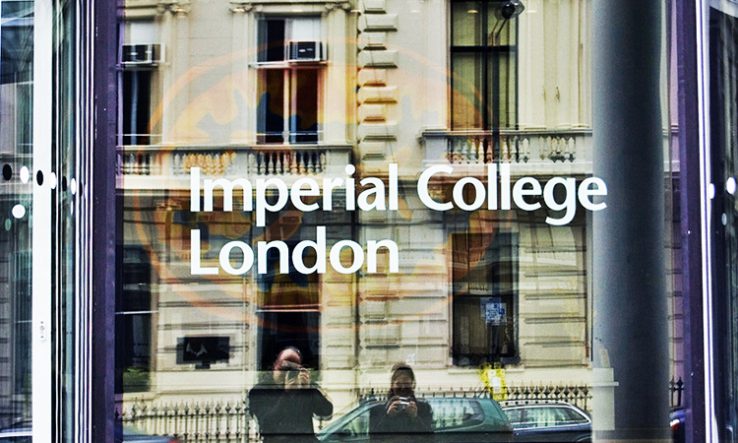
Image: Cristiano Betta [CC BY 2.0], via Flickr
Academics say the newly introduced £80 fee acts as a barrier for financially underprivileged applicants
Staff at Imperial College London have accused the university of discouraging underprivileged applicants after it imposed a new postgraduate application fee just weeks after academics at the University of Oxford voted to abolish theirs.
Last week, Imperial College London imposed an £80 application fee for all of its postgraduate programmes, which it said covers the cost of processing applications. The institution also noted that the fee “may increase for future years of entry”.
The college previously charged a £135 application fee only for its MBA programmes.
In an open letter published exclusively in Research Professional News, more than 150 Imperial academics call for the college to abolish the admissions fee “as soon as reasonably possible” while ensuring there are no increases in the amount charged in the lead-up to its removal.
“Application fees for further study are a means of financial gatekeeping; by this we mean that fees act as a direct barrier for financially underprivileged applicants, who will be unable and discouraged to study at Imperial,” the academics say.
The signatories claim the fee also directly contravenes the college’s equality, diversity and inclusion strategy, its learning and teaching strategy, as well as undermining “all our initiatives to widen participation”.
They estimate that the college typically receives six applications for each place for postgraduate study, amounting to around £1.9 million with the new fee.
“Especially in the Covid-19 pandemic, this may seem attractive for the college, but amounts to only 0.18 per cent of a total college income of £1.07 billion, of which £313m is sourced from tuition fees and educational contracts,” they wrote.
“This short-term gain must be considered together with the substantial long-term reputational damage to our recruitment.”
Furthermore, they added, the fee is “harmful for any student who can only apply for a scholarship once they have received an offer to study from us” and will “especially impact our international students who are also liable for other fees”.
An Imperial College London spokesperson described the new fee as a “pilot” introduced “to help cover some of the administrative and staffing costs associated with processing the large volume of masters applications that Imperial receives”.
They added: “No applicant will be obliged to pay this fee if they cannot afford it. We will waive the fee for any applicant—home or international—who demonstrates they are experiencing financial hardship.
“The process for applying for a waiver is simple and we expect to make assessments to be made swiftly,” they said. “Individual departments can also waive the fee to applicants directly on academic grounds. We will also shortly be announcing a larger package of scholarship opportunities targeted at those most requiring support.”
Even with a fee waiver in place for financially disadvantaged applicants, the signatories question whether a student should be made to disclose the extent of their personal financial hardship.
The campaign comes just two weeks after staff at the University of Oxford voted to scrap their institution’s £75 graduate application fee, following concerns that it was restricting access to the elite university.
The campaign to abolish the fee at Imperial was started by Ben Britton, a reader in metallurgy and microscopy at the university.
“Widening participation and access to education is very important,” he told Research Professional News. “Recent evidence has highlighted that there is a specific disadvantage for less financially able individuals in terms of access and that impacts the pipeline and pathways within academia and beyond.
“It’s therefore disappointing that Imperial, as a sector leader in this space, has introduced a policy that seems to contravene our equality diversity and inclusion strategy as well as our teaching and learning strategy.”
Britton added that the decision came as a surprise to him and his colleagues “particularly in light of Oxford’s congregation decision”.
Benjamin Fernando, a former Imperial undergraduate who led the campaign to scrap the application fee at Oxford, where he is a PhD student, added: “It’s both saddening and frankly quite shocking that less than two weeks after Oxford abolished its application fees, Imperial has decided to bring its own in.
“The timing and content of this announcement risk doing serious reputational damage and I trust the college will think long and hard about reversing course immediately.”
Together with several other Imperial alumni, Fernando has started a separate petition to scrap the fee in which the signatories call on the university to “abandon this elitist and discriminatory fee immediately”.
Click here to sign the open letter from Imperial academics.
Click here to sign the petition from Imperial alumni.